- Home
- E. F. Benson
Michael Page 14
Michael Read online
Page 14
charge, so to speak, except for your ticket, but acollection is made, as happens at meetings, and you pay with yournerves. You must cancel my annoyance, please. If I showed it I did notmean to."
Michael pondered over this.
"But I can't leave it like that," he said at length. "Was it about thepossibility of war, which I said was unthinkable?"
Falbe laughed and turned on his elbow towards Michael.
"No, my dear chap," he said. "You may believe it to be unthinkable, andI may believe it to be inevitable; but what does it matter what eitherof us believes? Che sara sara. It was quite another thing that caused meto annoy myself. It does not matter."
Michael lay back on the soft slope.
"Yet I insist on knowing," he said. "That is, I mean, if it is notprivate."
Falbe lay quietly with his long fingers in the sediment of pine-needles.
"Well, then, as it is not private, and as you insist," he said, "I willcertainly tell you. Does it not strike you that you are behaving like anabsolute stranger to me? We have talked of me and my home and myplans all the time since we met at Victoria Station, and you have keptcomplete silence about yourself. I know nothing of you, not who you are,or what you are, or what your flag is. You fly no flag, you proclaim noidentity. You may be a crossing-sweeper, or a grocer, or a marquis forall I know. Of course, that matters very little; but what does matter isthat never for a moment have you shown me not what you happen to be,but what you are. I've got the impression that you are something, thatthere's a real 'you' in your inside. But you don't let me see it. Yousend a polite servant to the door when I knock. Probably this soundsvery weird and un-English to you. But to my mind it is much more weirdto behave as you are behaving. Come out, can't you. Let's look at you."
It was exactly that--that brusque, unsentimental appeal--that Michaelneeded. He saw himself at that moment, as Falbe saw him, a shelled andmuffled figure, intangible and withdrawn, but observing, as it were,through eye-holes, and giving nothing in exchange for what he saw.
"I'm sorry," he said. "It's quite true what you tell me. I'm like that.But it really has never struck me that anybody cared to know."
Falbe ceased digging his excavation in the pine-needles and looked up onMichael.
"Good Lord, man!" he said; "people care if you'll only allow them to.The indifference of other people is a false term for the secretivenessof oneself. How can they care, unless you let them know what there is tocare for?"
"But I'm completely uninteresting," said Michael.
"Yes; I'll judge of that," said Falbe.
Slowly, and with diffident pauses, Michael began to speak of himself,feeling at first as if he was undressing in public. But as he went onhe became conscious of the welcome that his story received, though thatwelcome only expressed itself in perfectly unemotional monosyllables. Hemight be undressing, but he was undressing in front of a fire. He knewthat he uncovered himself to no icy blast or contemptuous rain, as hehad felt when, so few days before, he had spoken of himself and whathe was to his father. There was here the common land of music to buildupon, whereas to Lord Ashbridge that same soil had been, so to speak,the territory of the enemy. And even more than that, there was theinstinct, the certain conviction that he was telling his tale tosympathetic ears, to which the mere fact that he was speaking of himselfpresupposed a friendly hearing. Falbe, he felt, wanted to know abouthim, regardless of the nature of his confessions. Had he said that hewas an undetected kleptomaniac, Falbe would have liked to know, havebeen pleased at any tidings, provided only they were authentic. Thisseemed to reveal itself to him even as he spoke; it had been therewaiting for him to claim it, lying there as in a poste restante, onlyready for its owner.
At the end Falbe gave a long sigh.
"And why the devil didn't you give me any hint of it before?" he asked.
"I didn't think it mattered," said Michael.
"Well, then, you are amazingly wrong. Good Lord, it's about the mostinteresting thing I've ever heard. I didn't know anybody could escapefrom that awful sort of prison-house in which our--I'm English now--inwhich our upper class immures itself. Yet you've done it. I take it thatthe thing is done now?"
"I'm not going back into the prison-house again, if you mean that," saidMichael.
"And will your father cut you off?" asked he.
"Oh, I haven't the least idea," said Michael.
"Aren't you going to inquire?"
Michael hesitated.
"No, I'm sure I'm not," he said. "I can't do that. It's his business.I couldn't ask about what he had done, or meant to do. It's a sortof pride, I suppose. He will do as he thinks proper, and when he hasthought, perhaps he will tell me what he intends."
"But, then, how will you live?" asked Falbe.
"Oh, I forgot to tell you that. I've got some money, quite a lot, Imean, from my grandmother. In some ways I rather wish I hadn't. It wouldhave been a proof of sincerity to have become poor. That wouldn't havemade the smallest difference to my resolution."
Falbe laughed.
"And so you are rich, and yet go second-class," he said. "If I were richI would make myself exceedingly comfortable. I like things that aregood to eat and soft to touch. But I'm bound to say that I get onquite excellently without them. Being poor does not make the smallestdifference to one's happiness, but only to the number of one'spleasures."
Michael paused a moment, and then found courage to say what for the lasttwo days he had been longing to give utterance to.
"I know; but pleasures are very nice things," he said. "And doesn't itseem obvious now that you are coming to Munich with me? It's a purelyselfish suggestion on my part. After being with you it will be verystupid to be alone there. But it would be so delightful if you wouldcome."
Falbe looked at him a moment without speaking, but Michael saw the lightin his eyes.
"And what if I have my pride too?" he said. "Then I shall apologise forhaving made the proposal," said Michael simply.
For just a second more Falbe hesitated. Then he held out his hand.
"I thank you most awfully," he said. "I accept with the greatestpleasure."
Michael drew a long breath of relief.
"I am glad," he said. "So that's settled. It's really nice of you."
The heat of the day was passing off, and over the sun-bleached plain thecoolness of evening was beginning to steal. Overhead the wind stirredmore resonantly in the pines, and in the bushes birds called to eachother. Presently after, they rose from where they had lain all theafternoon and strolled along the needled slope to where, through a vistain the trees, they looked down on the lake and the hamlet that clusterednear it. Down the road that wound through the trees towards it passedlabourers going homeward from their work, with cheerful guttural criesto each other and a herd of cows sauntered by with bells melodiouslychiming, taking leisurely mouthfuls from the herbage of the wayside.In the village, lying low in the clear dusk, scattered lights began toappear, the smoke of evening fires to ascend, and the aromatic odour ofthe burning wood strayed towards them up the wind.
Falbe, whose hand lay in the crook of Michael's arm, pointed downwardsto the village that lay there sequestered and rural.
"That's Germany," he said; "it's that which lies at the back of everyGerman heart. There lie the springs of the Rhine. It's out of thatoriginally that there came all that Germany stands for, its music, itspoetry, its philosophy, its kultur. All flowed from these quiet uplands.It was here that the nation began to think and to dream. To dreamt! It'sout of dreams that all has sprung."
He laughed.
"And then next week when we go to Munich, you will find me saying thatthis, this Athens of a town, with its museums and its galleries and itsmusic, is Germany. I shall be right, too. Out of much dreaming comesthe need to make. It is when the artist's head and heart are full ofhis dreams that his hands itch for the palette or the piano. Nuremberg!Cannot we stop a few hours, at least, in Nuremberg, and see the meadowby the Pegnitz where the Meistersingers held their cont
est of song andthe wooden, gabled house where Albrecht Durer lived? That will teach youGermany, too. The bud of their dream was opening then; and what flower,even in the magnificence of its full-blowing, is so lovely? AlbrechtDurer, with his deep, patient eyes, and his patient hands with theirunerring stroke; or Bach, with the fugue flowing from his brain throughhis quick fingers, making stars--stars fixed forever in the heavenof harmony! Don't tell me that there is anything in the world morewonderful! We may have invented a few more instruments, we may haveexperimented with a few more combinations of notes, but in the B
Michael pondered over this.
"But I can't leave it like that," he said at length. "Was it about thepossibility of war, which I said was unthinkable?"
Falbe laughed and turned on his elbow towards Michael.
"No, my dear chap," he said. "You may believe it to be unthinkable, andI may believe it to be inevitable; but what does it matter what eitherof us believes? Che sara sara. It was quite another thing that caused meto annoy myself. It does not matter."
Michael lay back on the soft slope.
"Yet I insist on knowing," he said. "That is, I mean, if it is notprivate."
Falbe lay quietly with his long fingers in the sediment of pine-needles.
"Well, then, as it is not private, and as you insist," he said, "I willcertainly tell you. Does it not strike you that you are behaving like anabsolute stranger to me? We have talked of me and my home and myplans all the time since we met at Victoria Station, and you have keptcomplete silence about yourself. I know nothing of you, not who you are,or what you are, or what your flag is. You fly no flag, you proclaim noidentity. You may be a crossing-sweeper, or a grocer, or a marquis forall I know. Of course, that matters very little; but what does matter isthat never for a moment have you shown me not what you happen to be,but what you are. I've got the impression that you are something, thatthere's a real 'you' in your inside. But you don't let me see it. Yousend a polite servant to the door when I knock. Probably this soundsvery weird and un-English to you. But to my mind it is much more weirdto behave as you are behaving. Come out, can't you. Let's look at you."
It was exactly that--that brusque, unsentimental appeal--that Michaelneeded. He saw himself at that moment, as Falbe saw him, a shelled andmuffled figure, intangible and withdrawn, but observing, as it were,through eye-holes, and giving nothing in exchange for what he saw.
"I'm sorry," he said. "It's quite true what you tell me. I'm like that.But it really has never struck me that anybody cared to know."
Falbe ceased digging his excavation in the pine-needles and looked up onMichael.
"Good Lord, man!" he said; "people care if you'll only allow them to.The indifference of other people is a false term for the secretivenessof oneself. How can they care, unless you let them know what there is tocare for?"
"But I'm completely uninteresting," said Michael.
"Yes; I'll judge of that," said Falbe.
Slowly, and with diffident pauses, Michael began to speak of himself,feeling at first as if he was undressing in public. But as he went onhe became conscious of the welcome that his story received, though thatwelcome only expressed itself in perfectly unemotional monosyllables. Hemight be undressing, but he was undressing in front of a fire. He knewthat he uncovered himself to no icy blast or contemptuous rain, as hehad felt when, so few days before, he had spoken of himself and whathe was to his father. There was here the common land of music to buildupon, whereas to Lord Ashbridge that same soil had been, so to speak,the territory of the enemy. And even more than that, there was theinstinct, the certain conviction that he was telling his tale tosympathetic ears, to which the mere fact that he was speaking of himselfpresupposed a friendly hearing. Falbe, he felt, wanted to know abouthim, regardless of the nature of his confessions. Had he said that hewas an undetected kleptomaniac, Falbe would have liked to know, havebeen pleased at any tidings, provided only they were authentic. Thisseemed to reveal itself to him even as he spoke; it had been therewaiting for him to claim it, lying there as in a poste restante, onlyready for its owner.
At the end Falbe gave a long sigh.
"And why the devil didn't you give me any hint of it before?" he asked.
"I didn't think it mattered," said Michael.
"Well, then, you are amazingly wrong. Good Lord, it's about the mostinteresting thing I've ever heard. I didn't know anybody could escapefrom that awful sort of prison-house in which our--I'm English now--inwhich our upper class immures itself. Yet you've done it. I take it thatthe thing is done now?"
"I'm not going back into the prison-house again, if you mean that," saidMichael.
"And will your father cut you off?" asked he.
"Oh, I haven't the least idea," said Michael.
"Aren't you going to inquire?"
Michael hesitated.
"No, I'm sure I'm not," he said. "I can't do that. It's his business.I couldn't ask about what he had done, or meant to do. It's a sortof pride, I suppose. He will do as he thinks proper, and when he hasthought, perhaps he will tell me what he intends."
"But, then, how will you live?" asked Falbe.
"Oh, I forgot to tell you that. I've got some money, quite a lot, Imean, from my grandmother. In some ways I rather wish I hadn't. It wouldhave been a proof of sincerity to have become poor. That wouldn't havemade the smallest difference to my resolution."
Falbe laughed.
"And so you are rich, and yet go second-class," he said. "If I were richI would make myself exceedingly comfortable. I like things that aregood to eat and soft to touch. But I'm bound to say that I get onquite excellently without them. Being poor does not make the smallestdifference to one's happiness, but only to the number of one'spleasures."
Michael paused a moment, and then found courage to say what for the lasttwo days he had been longing to give utterance to.
"I know; but pleasures are very nice things," he said. "And doesn't itseem obvious now that you are coming to Munich with me? It's a purelyselfish suggestion on my part. After being with you it will be verystupid to be alone there. But it would be so delightful if you wouldcome."
Falbe looked at him a moment without speaking, but Michael saw the lightin his eyes.
"And what if I have my pride too?" he said. "Then I shall apologise forhaving made the proposal," said Michael simply.
For just a second more Falbe hesitated. Then he held out his hand.
"I thank you most awfully," he said. "I accept with the greatestpleasure."
Michael drew a long breath of relief.
"I am glad," he said. "So that's settled. It's really nice of you."
The heat of the day was passing off, and over the sun-bleached plain thecoolness of evening was beginning to steal. Overhead the wind stirredmore resonantly in the pines, and in the bushes birds called to eachother. Presently after, they rose from where they had lain all theafternoon and strolled along the needled slope to where, through a vistain the trees, they looked down on the lake and the hamlet that clusterednear it. Down the road that wound through the trees towards it passedlabourers going homeward from their work, with cheerful guttural criesto each other and a herd of cows sauntered by with bells melodiouslychiming, taking leisurely mouthfuls from the herbage of the wayside.In the village, lying low in the clear dusk, scattered lights began toappear, the smoke of evening fires to ascend, and the aromatic odour ofthe burning wood strayed towards them up the wind.
Falbe, whose hand lay in the crook of Michael's arm, pointed downwardsto the village that lay there sequestered and rural.
"That's Germany," he said; "it's that which lies at the back of everyGerman heart. There lie the springs of the Rhine. It's out of thatoriginally that there came all that Germany stands for, its music, itspoetry, its philosophy, its kultur. All flowed from these quiet uplands.It was here that the nation began to think and to dream. To dreamt! It'sout of dreams that all has sprung."
He laughed.
"And then next week when we go to Munich, you will find me saying thatthis, this Athens of a town, with its museums and its galleries and itsmusic, is Germany. I shall be right, too. Out of much dreaming comesthe need to make. It is when the artist's head and heart are full ofhis dreams that his hands itch for the palette or the piano. Nuremberg!Cannot we stop a few hours, at least, in Nuremberg, and see the meadowby the Pegnitz where the Meistersingers held their cont
est of song andthe wooden, gabled house where Albrecht Durer lived? That will teach youGermany, too. The bud of their dream was opening then; and what flower,even in the magnificence of its full-blowing, is so lovely? AlbrechtDurer, with his deep, patient eyes, and his patient hands with theirunerring stroke; or Bach, with the fugue flowing from his brain throughhis quick fingers, making stars--stars fixed forever in the heavenof harmony! Don't tell me that there is anything in the world morewonderful! We may have invented a few more instruments, we may haveexperimented with a few more combinations of notes, but in the B

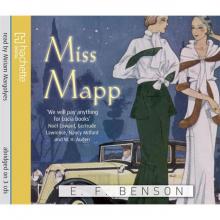 Miss Mapp
Miss Mapp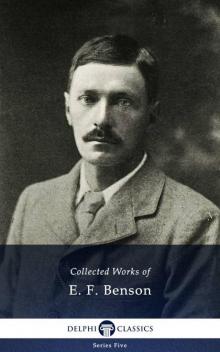 Works of E F Benson
Works of E F Benson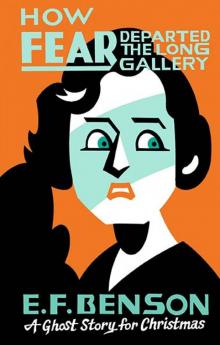 How Fear Departed the Long Gallery
How Fear Departed the Long Gallery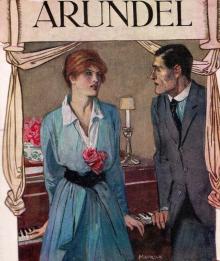 Dodo's Daughter: A Sequel to Dodo
Dodo's Daughter: A Sequel to Dodo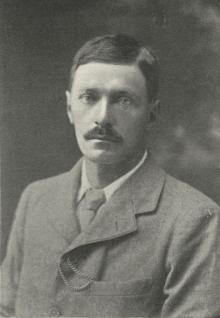 The House of Defence v. 1
The House of Defence v. 1 Queen Lucia
Queen Lucia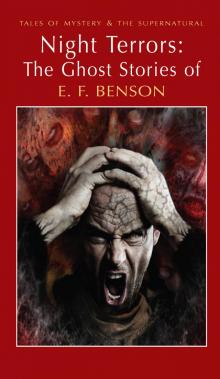 Night Terrors
Night Terrors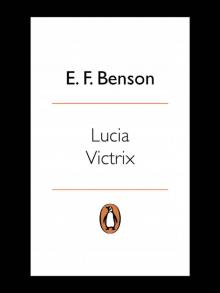 Lucia Victrix
Lucia Victrix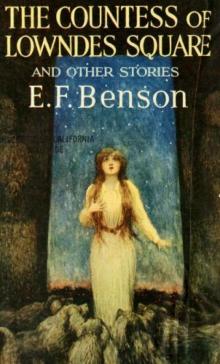 The Countess of Lowndes Square and Other Stories
The Countess of Lowndes Square and Other Stories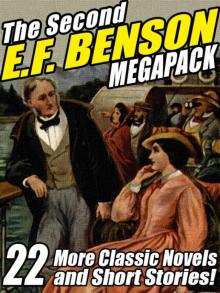 The Second E. F. Benson Megapack
The Second E. F. Benson Megapack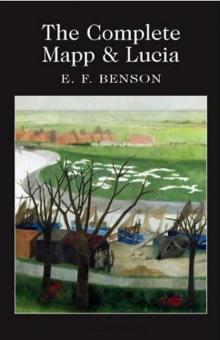 The Complete Mapp & Lucia
The Complete Mapp & Lucia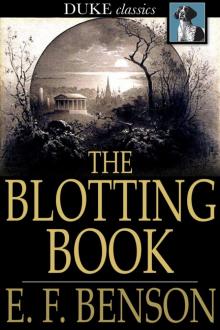 The Blotting Book
The Blotting Book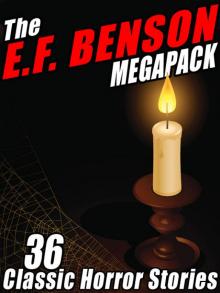 The E. F. Benson Megapack
The E. F. Benson Megapack Lucia Rising
Lucia Rising Ghost Stories
Ghost Stories Mrs. Ames
Mrs. Ames E. F. Benson
E. F. Benson